The following post features portions of an interview with Em Herriott (they/them) of We Are Here Coffee. Some quotes have been lightly edited for clarity and flow.
Introducing We Are Here Coffee
On the northern coast of Kent in England, there’s a small but buzzing seaside town called Margate. It’s a historic resort spot, peppered with amusements and arcades, a thriving food and drink scene, and golden sand beaches. In that town, the local community thrives together as the tourists come and go with the seasons, mainly pleased to have the town to themselves as the summer comes to close.
On one street, a brilliantly pink door is set against a rustic brick building, inviting people to come see what it’s about. Above the door, the phrase “We Are Here” declares itself.
Walking through that door brings you to We Are Here Coffee, the unpretentious, rainbow-colored work home of Em Herriott. On roasting days, you’ll find them in coveralls and a neon beanie, pouring green beans into the hopper of their Loring S7 Nighthawk by hand and packing up bags of roasted coffee for shipment.
It feels cozy. It feels like home. But it didn’t always.
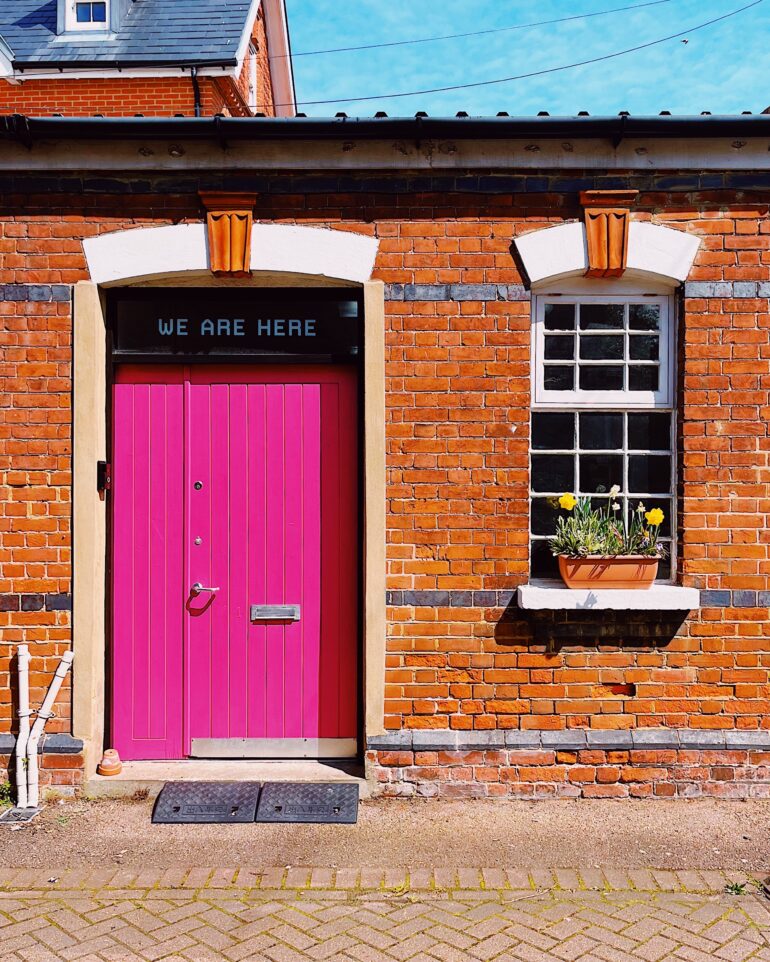
Getting Started
Em didn’t start out in the specialty coffee industry – they didn’t even especially care for coffee at first, really. As many people do, they got their start at Costa and Starbucks at Gatwick Airport in London. As one can imagine, it wasn’t the best introduction to the coffee business.
“[… it’s] the only place I’ve ever walked out of, the drama!” Em says.
We’ve all had a job like that at one point or another. After that brief stint in corporate coffee, Em worked in offices for several years before venturing back into the coffee industry, this time on the specialty coffee side.
“Nude [Coffee Roasters] was my first taste of heaven and suddenly, I got it,” Em says. “A year or so later after lots of training, planning, and saving, I quit my job and We Are Here was born.”
The Age of the Tuk-Tuk
As a fledging business, We Are Here started small. Em initially sold prepared coffee as a street trader from a mobile tuk-tuk (a three-wheeled mini auto) that they affectionately dubbed “Fred.” They lived in the Leyton area of East London and sold to the local community, but not everything went to plan.
“There were a lot of issues with power, my spot being taken away by the council, and then finally Fred being stolen,” Em says.
Initially, the name We Are Here was tied to the mobile nature of the business. Em could notify customers “We Are Here at [Location] this week” so people could always find the tuk-tuk. It was a difficult but rewarding time, up until Fred disappeared and Em changed direction to a local roastery for a few years while they got back on their feet.
At last, in 2019, that work paid off when it was time to start We Are Here 2.0, this time as a roastery with a brick-and-mortar location. Around this time, Em packed up and made the move to “marvelous Margate,” where the roastery took root just as the 2020 lockdown started.
It’s then that We Are Here started to take on a new meaning.
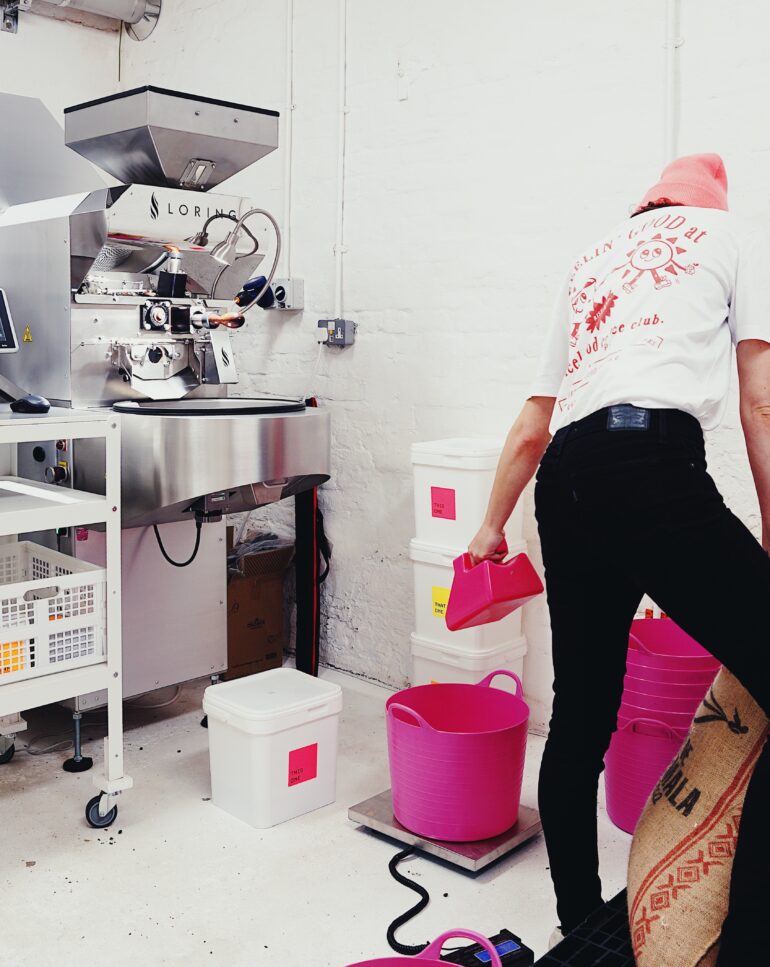
We’re Here, We’re Queer
Em is queer. This isn’t a secret; it’s a truth that they are proud to share and incorporate into We Are Here. Though the business didn’t start with the subject in mind – street trade simply isn’t a safe place for queerness to be on display – the name proved to be remarkably apt.
In queer culture, there’s a common refrain: “We’re here, we’re queer, get used to it.” The slogan hails back to the 1990s when the LGBTQ activist organization Queer Nation coined it for use as a chant during protests and rallies promoting LGBTQ visibility. While the word “queer” moves in and out of vogue as an acceptable term in the community due to its roots as a slur, many LGBTQIA+ folks choose to self-identify as queer, Em included.
As We Are Here Coffee moved from street sales to a roastery, it was time to reimagine what it could mean to the specialty coffee industry at large to see that sort of representation.
“Cafes and coffee are largely represented by white, cis[gender] males,” Em says. “There’s a huge community not seeing themselves or being supported. I’m a white, female-presenting queer person and have a huge amount of privilege that comes with that. I really need to make space for other communities and, by doing so, hope others will follow suit. There’s a lot more we can do.”
Demystifying Specialty Coffee
Another method of improving the accessibility of specialty coffee for people beyond the industry – and that’s accessibility as in access to the work and knowledge, as opposed to disability access, which is also an issue – is demystifying the coffee itself.
“I thought, we’ve gotta help people try some amazing specialty coffee without the risk of a bad experience or stop them feeling so overwhelmed with choices in unfriendly environments,” Em says. “We can make it fun, we can make it friendly, we can help educate and we can cater for a lot of tastes easily!”
One way Em’s decided to make that a reality is by offering a reduced line of coffees with easy-to-understand brew guides and tasting notes. Rather than having an extensive catalog, We Are Here offers four coffees: This One, That One, The Other One, and Decaf.
“The names needed to be straightforward and not detract or boost any of the coffee bags by making one sound better than the other,” Em says. “These cover an espresso coffee, a filter/cafetiere that’s good with or without milk, a filter that’s good black (mainly juicy ones), and a decaf.”
The goal is to avoid overwhelming the average consumer with a large portfolio of origins and blends with complex tasting notes that make it difficult to tell one from another. If someone knows they like espresso, This One’s the recommended option. If they prefer filter? Try The Other One instead. Instead of assuming the knowledge is shared, Em instead frames coffee in a way every coffee drinker can understand.
There’s still plenty of room in the industry for tons of options and experimental roasts, but for Em’s crowd, they like to keep it uncomplicated.
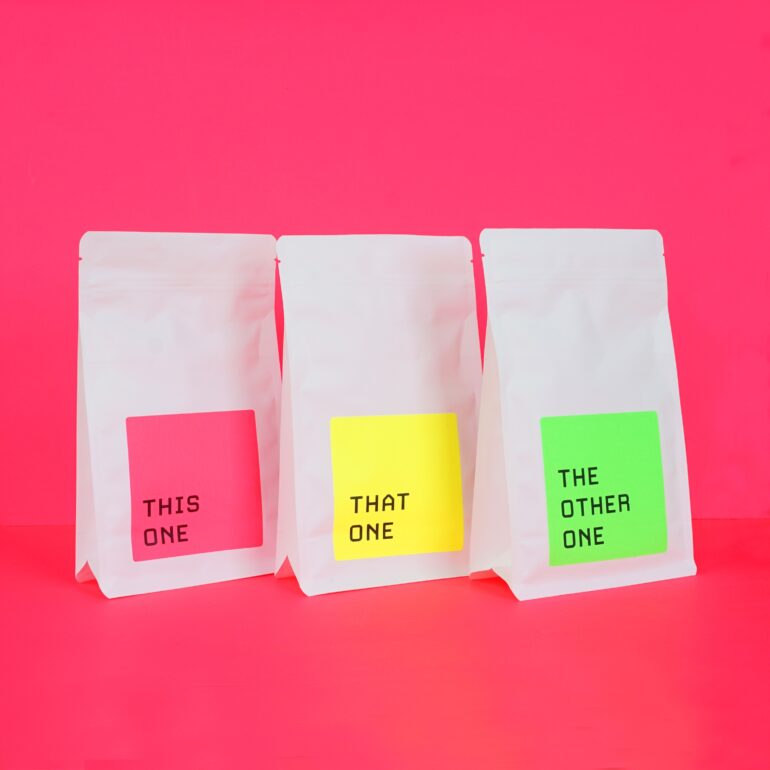
Supporting Charity
As is common among many of the socially conscious folks in the specialty coffee industry, Em incorporated charity into We Are Here’s business practices from the start. They support nonprofit organizations like Missing People UK and Gendered Intelligence.
Missing People is an especially personal choice. This is the organization that helped Em’s own family years ago when their brother went missing. The nonprofit provides support both to the families of missing people and to those who are at risk of becoming missing people.
The other charity, Gendered Intelligence, provides education and support for transgender youth in the UK. Given the wide anti-trans sentiments currently circulating in many countries all over the world, including the UK, support networks for these at-risk youths are more important than ever.
We Are Here Coffee sets aside a portion of proceeds from every bag of coffee sold for one of these two organizations and the buyer decides where their donation goes by choosing the design of the label on each of the four available coffees. Donations for Gendered Intelligence are represented by The Queer One, which swaps the usual neon for the latest progress flag.
Colors of the Rainbow
There’s no two ways about it – We Are Here Coffee is bright, literally. Em loves neon colors, of course, but ultimately choosing the bright, bold neon packaging for We Are Here came down to the balance between simplicity and boldness.
“If it doesn’t hurt your eyes, it’s not bright enough, right?” Em says. “The choice of neon came from having such minimal packaging. If we’ve just two or three words on the front of the bag, how can we be sure people pick it up? Well, make it unavoidable!”
It’s a sound strategy. When potential customers walk down an aisle full to bursting with different coffees, their eye will be drawn to something bold. Em enjoys it very much when people are drawn in by the neon and then have a chuckle when they read the name on the bag.
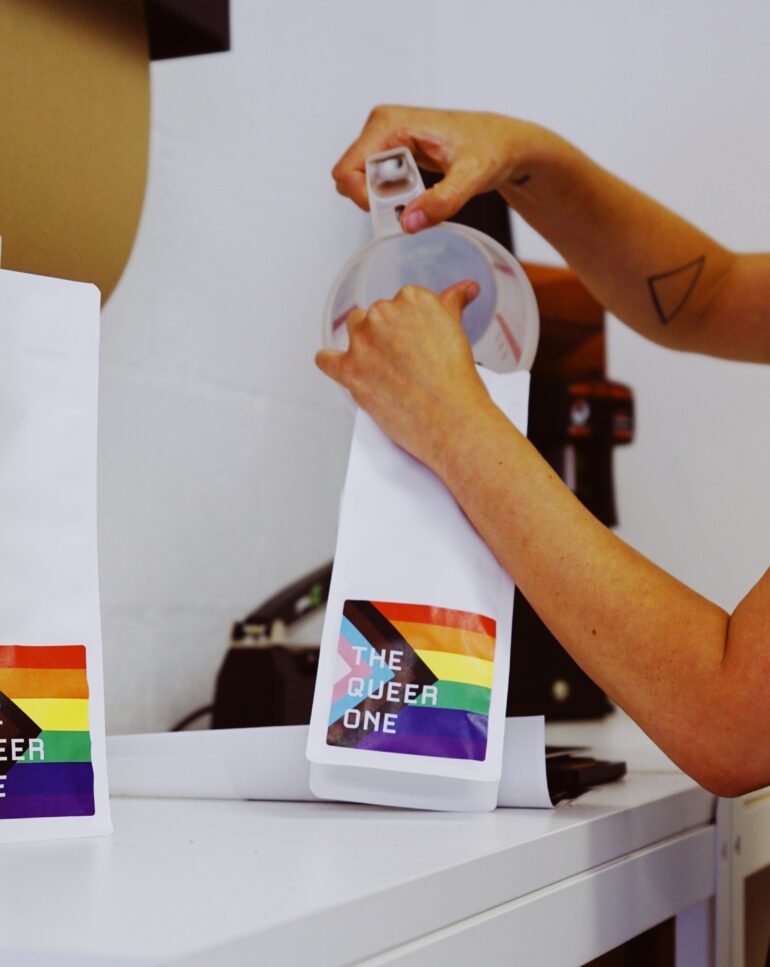
Tiny Roasters for Tiny Spaces
When one’s running a small operation in a place where space is at a premium, it’s vital to make the most of it. The We Are Here Coffee roastery comes in at a modest 4×6 meters (about 260 square feet). Naturally, space restrictions were a primary concern when Em was determining how they were going to roast. Enter the Loring S7 Nighthawk, a powerful roaster with a small footprint.
Em brought Loring’s littlest roaster into their space and lovingly named her “Erna.” They’re able to maintain their valuable production and desk space while ensuring their neighbors don’t have to be exposed to puffs of smoke trailing from the roastery. It’s a win-win.
“As we grow, we’ll keep Erna as part of a Loring family for one-offs, training or competition roasts,” Em says.
Good Businesses Can Exist
As climate crises continue around the globe and exploitation rises every year, it can be difficult to believe that any business could do good in the world. Em wants to believe it’s possible and they do all they can with the opportunities they have to prove it. It may not be world-altering, but it can be world-impacting.
As Em says, they want to create “A place that actually cares about the people that work there, pays them well, supports them, helps them grow and be themselves. As a queer, disabled person, I’ve often found it impossible to work in a ‘regular’ workplace. It’s not flexible, not empathetic, not supportive. We Are Here was created not only to support me in a way that works, but to do that for others. One of our tag lines is ‘Do Something Good’ because we’ll always make choices that maybe make our accountant unhappy but hopefully make the world a tiny bit better.”
Sometimes, a tiny bit is all you can control, and it still makes a difference. Another way Em makes choices to support the people around them is by supporting local businesses in Margate whenever possible. To them, using local businesses simply makes sense. It keeps money in the local community while giving neighbors a chance to connect on a real, personal level. There are no additional shipping or environmental impacts the way there would be when ordering from an external vendor.
“We give away our pallets and sacks to locals, our coffee grounds and chaff go to an eco-fashion designer who makes coffee leather,” Em says. “Any extra coffee gets given to our NHS ambulance neighbors. Nothing is wasted and I love that.”
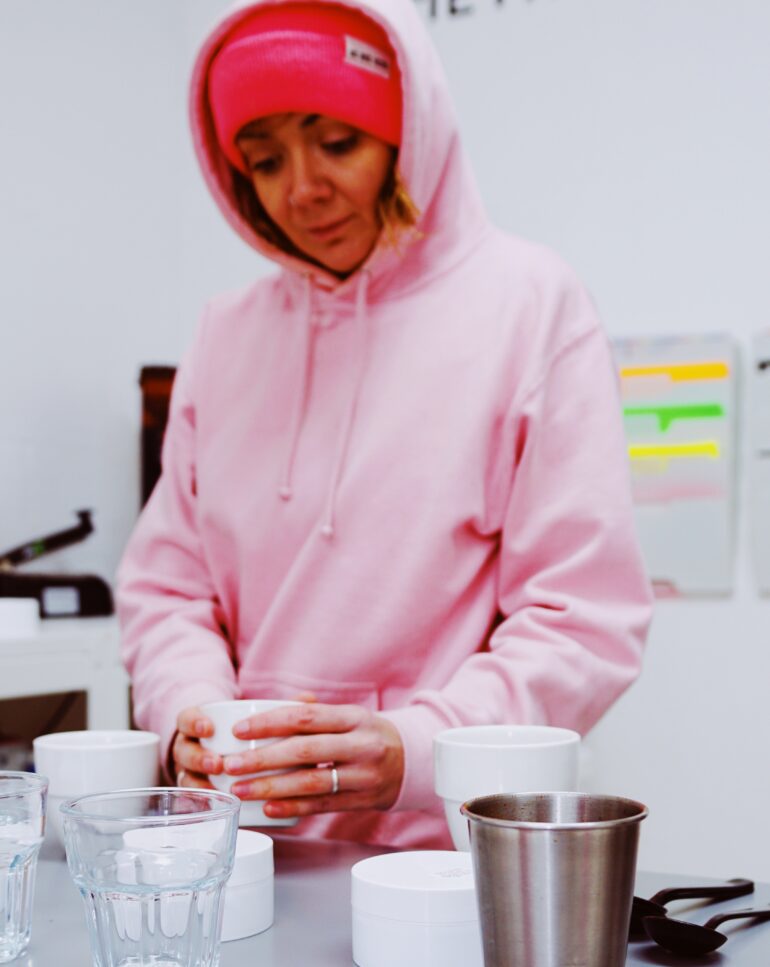
In Coffee Conclusion
We Are Here is a lovely example of a small, local business making an impact on their community in a variety of ways. Too often, it’s easy to become jaded with the state of the world and what we as individuals can realistically accomplish.
Nonetheless, people like Em show us every day that showing up for your community, elevating the coffee industry, and making better choices will improve the world around you. And if you can do that with a smile and a brightly colored coffee bag? All the better.